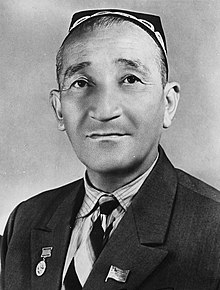You can helpexpand this article with text translated fromthe corresponding articlein Russian.(May 2024)Click [show] for important translation instructions.
|
Gʻafur Gʻulom[a](May 10, 1903 – July 10, 1966) was anUzbekpoet, writer, and literary translator. He is best remembered for his storiesShum Bola(The Mischievous Boy) (adapted forfilmin 1977) andYodgor.Gʻafur Gʻulom is also known for translating the works of many influential foreign authors, such asAlexander Pushkin,Vladimir Mayakovsky,andWilliam Shakespeare.He translatedLe Mariage de FigaroofPierre Beaumarchais,Othelloof William Shakespeare, andGulistanofSaadi Shiraziinto Uzbek.
Gʻafur Gʻulom Ғафур Ғулом | |
|---|---|
 | |
| Born | Gʻafur Gʻulomovich Gʻulomov May 10, 1903 Tashkent Russian Turkestan,Russian Empire |
| Died | July 10, 1966(aged 63) Tashkent Uzbek SSR,Soviet Union |
| Occupation | Poet, teacher, literary translator, and writer |
| Literary movement | realism |
| Notable awards |
|
| Children | Kadyr Gulyamov |
Gʻafur Gʻulom is considered to be one of the most influential Uzbek writers of the 20th century.[1]He is also regarded as one of the founders of modern Uzbek poetry, along withHamza Hakimzoda Niyoziy.[2]Gʻafur Gʻulom received the prestigiousState Stalin Prizein 1946 and became aNational Poetof theUzbek SSRin 1963.[3]
Life
editGʻafur Gʻulomovich Gʻulomov was born to a poor family on May 10, 1903, inTashkent.His father, Gʻulom Mirza Orif, knew Russian and was fond of reading poems and could himself write poetry. He died when Gʻafur Gʻulom was only nine years old.
Gʻafur Gʻulom first went to a so-calledold school,a quasi-Muslim school, and later enrolled in a Russiantuzemschool (Russian:Ру́сско-тузе́мная шко́ла), an elementary school for non-Russians inTurkestan.After completing a teacher preparation program, he started to teach at a contemporary school. In 1923, he was appointed the head of the curriculum department at anorphanage.During that time Gʻafur Gʻulom also started working on the editorial board of different publications, such asKambagʻal dehqon(The Poor Farmer),Qizil Oʻzbekiston(Red Uzbekistan), andSharq haqiqati(The Truth of the East). Working on editorial boards gave him a chance to learn about the life of ordinary citizens.
Gʻafur Gʻulom was also a supporter of theJewishpeople, and promoted peaceful relations with them. DuringWorld War IIhe wrote a poem called "Men – Yahudiy" or "I'm a Jew". His wife was anAshkenazi Jew.
Gʻulom died of illness at the age of sixty three on 10 July 1966, inTashkent.
Archives show that he issued denunciations of other Uzbek writers to Soviet authorities.[4]Unlike some of his counterparts who were also informants, he never showed any regret for the denunciations he issued.[5]
Works
editGʻafur Gʻulom's first poetry collections,Dinamo(Dynamo) andTirik qoʻshiqlar(Alive Songs), were published in 1931 and 1932, respectively. In these books he criticized the unsophisticated traditions of the peoples of Turkestan and praised the diligent work of ordinary citizens. In the 1930s, in addition to numerous short stories, essays, and satirical articles, Gʻafur Gʻulom wrote many longer narratives, such asNetay(What Should I Do?),Yodgor,andTirilgan murda(The Corpse that Came Alive).
During theSoviet-German waragainstNazi Germanyand itsallies,Gʻafur Gʻulom devoted his time and efforts to writing about the war. His poemsSen yetim emassan(You're not an Orphan),Oltin medal(The Golden Medal),Kuzatish(Seeing off),Vaqt(Time), andSogʻinish(Missing) became highly popular among Uzbeks.
In 1943, Gʻafur Gʻulom became a member of theAcademy of Sciences of Uzbekistan.During the last 20 years of his life, he published almost twenty poetry books. Many of his works have been translated into other languages.
Gʻafur Gʻulom received many awards and honors throughout his life.[6]He was awarded theOrder of the Badge of Honourin 1944. For his compilation of poems about theSoviet-German war,Sharqdan kelayotirman(I'm Coming from the East), Gʻafur Gʻulom was awarded theState Stalin Prizein 1946. He received theOrder of the Red Banner of Labourtwice, in 1939 and 1963. He was also twice awarded theOrder of Lenin.In 1970, he was posthumously awarded theLenin Prize.In 2000, Gʻafur Gʻulom was posthumously awarded the National Order of Merit (Uzbek:Buyuk xizmatlari uchun), one of independentUzbekistan's the most prestigious medals.[7]
See also
editNotes
editReferences
edit- ^"Gʻafur Gʻulom".Ziyouz(in Uzbek).RetrievedFebruary 4,2012.
- ^Mirbadaleva, A. S. "Gafur Gulyam". In A. M. Prokhorov (ed.).Great Soviet Encyclopedia(in Russian). Moscow: Soviet Encyclopedia.
- ^"Gʻafur Gʻulom".Ensiklopedik lugʻat(in Uzbek). Vol. 2. Toshkent: Oʻzbek sovet ensiklopediyasi. 1990. p. 210. 5-89890-018-7.
- ^Khalid, Adeeb (2015).Making Uzbekistan: Nation, Empire, and Revolution in the Early USSR.Cornell University Press.ISBN978-1-5017-0134-4.
- ^Ashur, Sadriddin (January 19, 2010)."Халқим деган Ойбек абадиятга қолди."[Oybek, who is called my people, has remained forever].Озодлик радиоси(in Uzbek).RetrievedDecember 15,2024.
- ^Zufarov, Komiljon, ed. (1980). "Gʻafur Gʻulom".Oʻzbek sovet ensiklopediyasi(in Uzbek). Vol. 14. Toshkent. pp.317–319.
{{cite encyclopedia}}:CS1 maint: location missing publisher (link) - ^"О НАГРАЖДЕНИИ МАСТЕРОВ ЛИТЕРАТУРЫ И ИСКУССТВА, ВНЕСШИХ ОГРОМНЫЙ ВКЛАД В РАЗВИТИЕ УЗБЕКСКОЙ НАЦИОНАЛЬНОЙ КУЛЬТУРЫ".lex.uz.RetrievedAugust 26,2023.